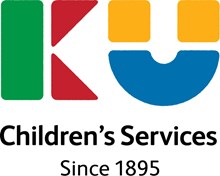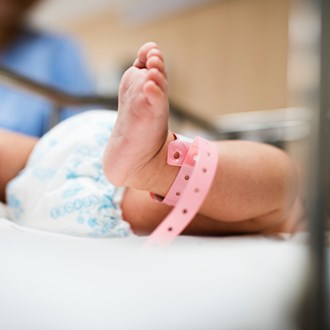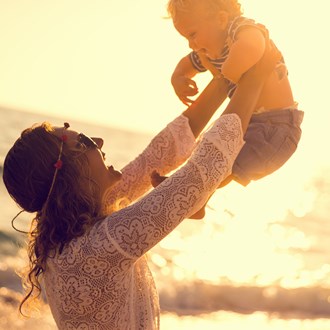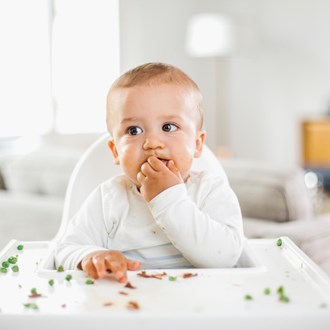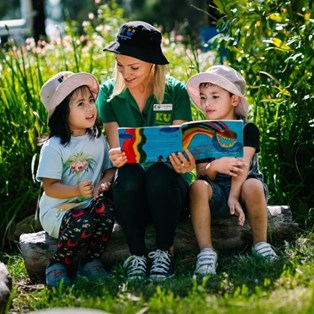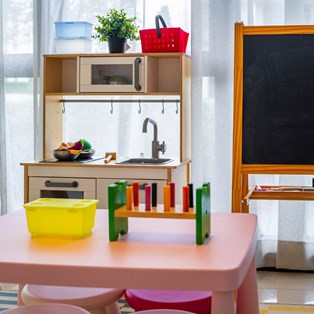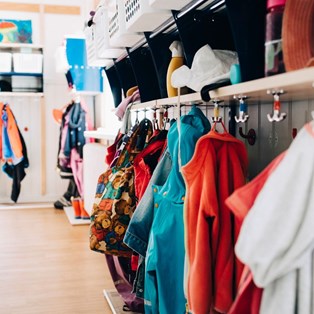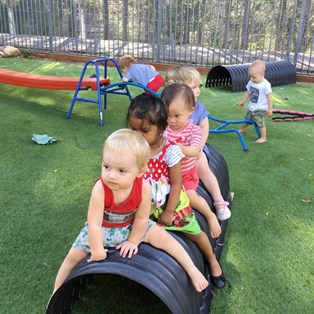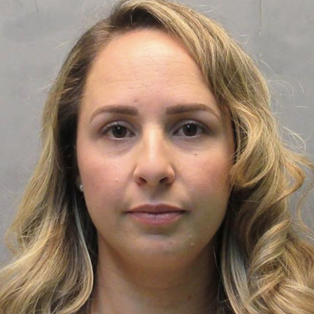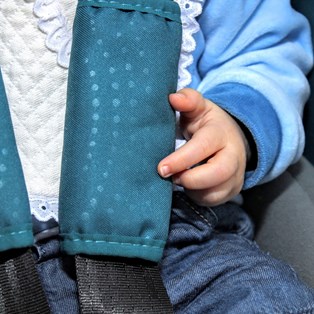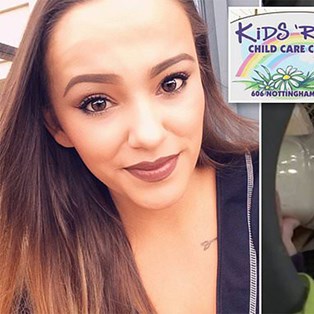What makes a great childcare facility? The 5 most important questions to ask
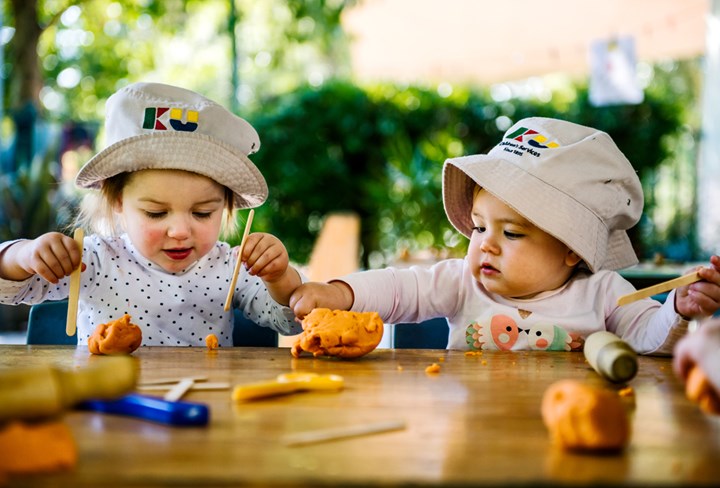
It’s one of the hardest things a parent can do – leave their precious child in the care of others. And for many parents the experience revolves around feelings of guilt and anxiety, and a continuous stream of tears - sometimes for both parent and child.
But for parents who’ve found a great childcare facility for their little one, well, they tell a very different story. One where their child enjoys going to childcare. They thrive. They socialise and bond with carers and other children. They live a positively creative, fun-filled day learning and playing while mum and dad go to work!
An no, this isn’t some unachievable fairy-tale! You just need to know what to look for, where to find the information and what questions to ask. Hint: we’ve done the hard work for you!
In Australia, early childhood education services are assessed under the National Quality Framework and given a rating out of five stars against the National Quality Standard (NQS). These ratings are displayed by childhood centres and also accessible via the Australian Children’s Education and Care Quality Authority (ACECQA).
Not only does this make early childhood centres accountable, but it creates transparency in their performance and ratings, with parents able to see where each centre’s strengths are and if relevant, areas they need to improve on.
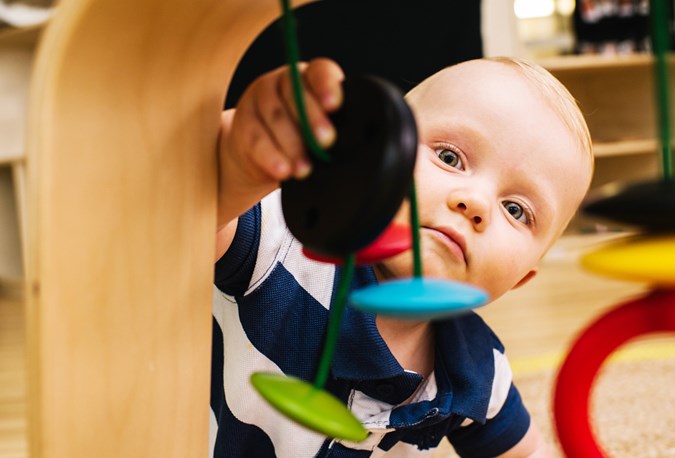
Christine Legg, CEO, KU Children’s Services says the introduction of the National Quality Framework (NQF) in 2012 was one of the most significant reforms for the early education sector across Australia for many decades.
“The NQF recognises the importance of quality learning experiences for children in their early years to ensure their present and future health, development and wellbeing,” Christine explains. “KU has long had a commitment to the provision of high quality early childhood education and care services and, as such, wholly supports this national assessment system. We are particularly proud that our services are achieving outstanding results in their assessment and rating visits – way above the rest of the sector.”
So what is it exactly that makes a great childcare facility? And what questions should you be asking before enrolling your little one?
Here’s your essential guide…
1. Above & beyond learning experiences
Learning can be fun, engaging, interesting and pique a child’s curiosity! Or, learning can be dull and boring… Not surprisingly, the former method has the best strike rate for nurturing a child’s lifelong love of learning!
In Australia, early childhood education programs are guided by national and state-based frameworks that recognise the importance of play-based learning and intentional teaching in the development of young children. These frameworks focus on developing relationships and skills such as cooperation, problem solving, curiosity and independence.
Great early childhood services, however, go above and beyond these frameworks.
“It’s really important in the early developmental years to recognise the individual strengths and interests of the children,” explains Christine Legg CEO, KU Children’s Services. “This way educators, along with parents, can develop individual or small group programs and experiences which acknowledge these strengths, challenge young children and promote learning. This contributes to each child’s sense of identity, wellbeing and confidence as learners.”
Christine adds that high quality early childhood services also provide programs that build relationships with the children and their families, and celebrate the diversity of the local community, which “help children develop an understanding of the world around them.”
What to ask: Are children’s individual strengths, abilities, ideas, interests, routine and home culture recognised? And if so, how are they incorporated into their learning experiences?
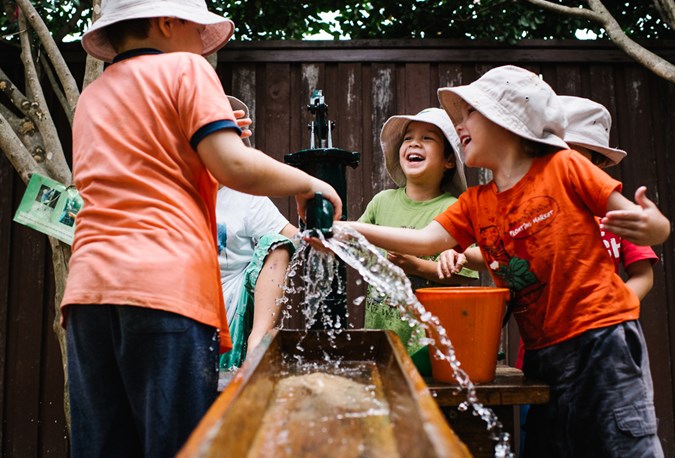
The National Quality Standard is separated into seven Quality Areas:
- Educational program and practice
- Children’s health and safety
- The physical environment
- Staffing arrangements
- Relationships with children
- Collaborative partnerships with families and communities
- Governance and leadership
Each Quality Area has a number of standards and elements that are assessed and rated. Following this, the service receives an ‘overall’ rating which should be displayed by the centre and is also available at the Australian Children’s Education and Care Quality Authority (ACECQA) website.
2. Children’s health and safety
Your child’s health and safety are paramount. You want to know that your little one is appropriately supervised and kept safe and protected from avoidable injuries and illness at all times.
And for children with special medical needs, such as diabetics and children with allergies or anaphylaxis, ensuring their individual health requirements is essential.
High quality childcare services do all this and more.
“Along with providing safe environments, high quality childcare services provide frequent opportunities for children to learn about and practice healthy lifestyles,” explains Christine. “These include personal safety and wellbeing, health and hygiene and nutrition.”
Christine says high quality childcare services also have plans in place for unexpected emergencies, practicing regular evacuation drills.
What to ask: How will the service incorporate your child’s specific nutritional or medical needs? Does the centre have a policy on health and safety, and a weekly nutritional meal plan?
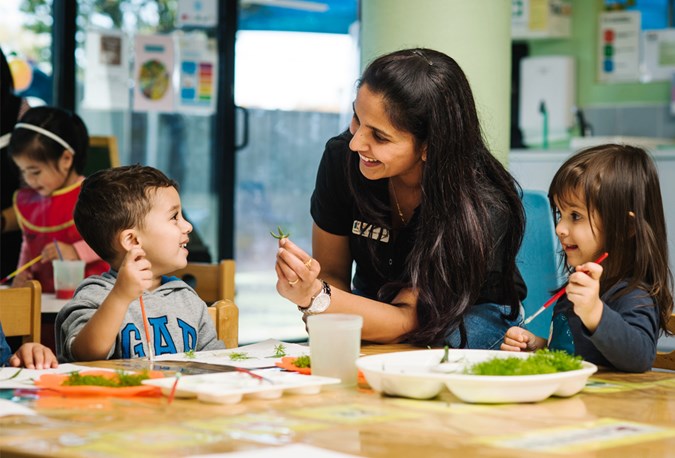
3. Play and the physical environment
Children may be little in height, but they are big on play!
An environment that nurtures and enhances children’s learning and development through play should be safe and welcoming, include indoor and outdoor play areas and have a range of age- and ability-appropriate equipment and resources.
High quality services offer children these essentials and more, including a variety of opportunities for learning and discovery through play, explains Christine.
“These additional opportunities encourage exploration, experimentation and creativity,” Christine says. “They may include planned areas set up for dramatic play, block building and construction; quiet spaces for reading, art and creativity; or room set aside for children to experiment with music and movement. And while not all centres have vast amounts of room, they will provide opportunities for children to learn from nature and the world around them, whether through water or sand play, natural objects rather than plastic toys, gardening, recycling or worm farms. Providing fun and welcoming physical environments support children’s growth and promote the development of confidence and a sense of belonging.”
What to ask: Does the environment provide opportunities for both indoor and outdoor experiences? Is there a range of equipment that is suitable for both younger and older children?
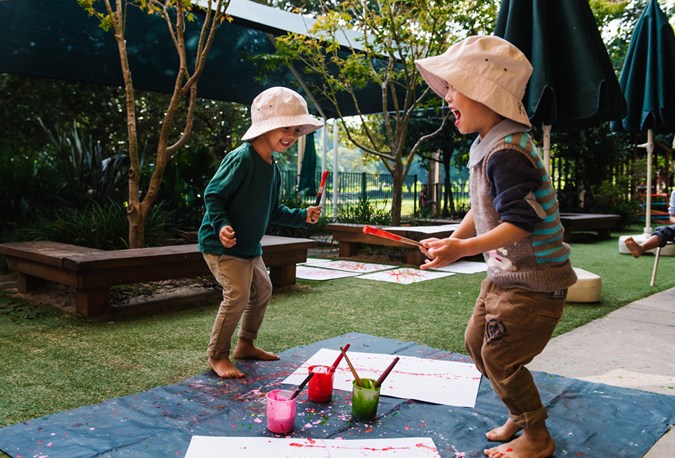
4. Staffing arrangements
Staff’s personalities and ‘staff to child ratios’ are important, but there are other staffing issues parents should be informed about too. Qualified and experienced educators play an important role in developing and maintaining high quality early childhood services. And consistent staff helps create an environment of trust, familiarity for the children and enable staff and families to work together.
Under the National Quality Standard, all early childhood services are required to meet specific regulations, including ‘staff to children ratios’ and minimum levels of staff qualifications.
“High quality services such as KU already have university qualified Early Childhood Teachers, but many services will transfer to this over time,” explains Christine. “Research shows that qualified and experienced early childhood staff can produce better social and cognitive outcomes for children. They create safe, well-planned learning environments for children to enjoy and maximise opportunities that extend children’s learning. Experienced educators are also able to develop warm and respectful relationships with the children and their families.”
What to ask: How many staff are there in each of the rooms at any time? Is there a consistent staff roster so children get to spend time with the same people each day? Does the service have a university qualified Early Childhood Teacher?
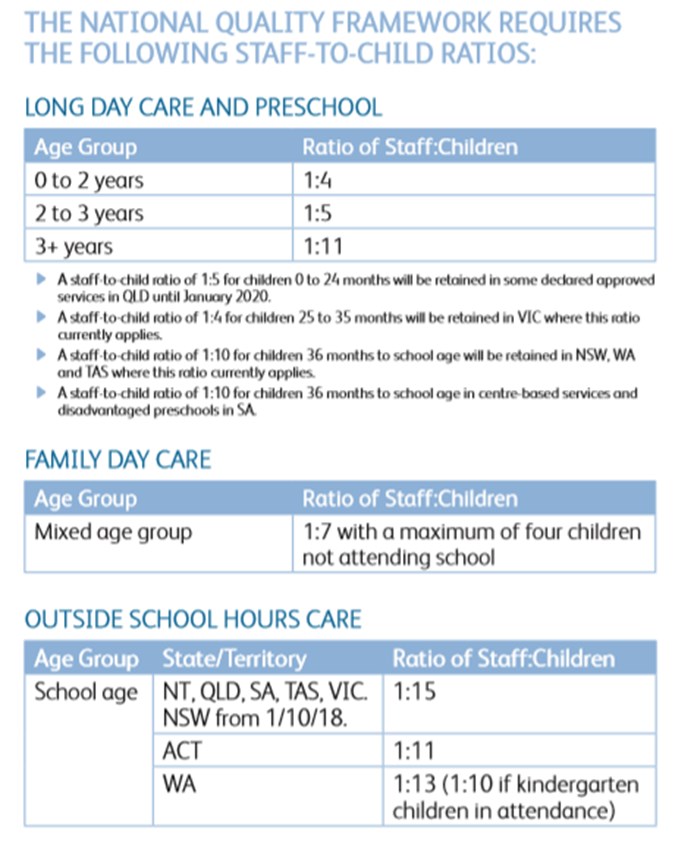
The National Quality Framework recommendations.
5. Relationships with children and educators
Strong relationships help children thrive, providing a secure foundation from which they can explore and learn, as well as build self-esteem and feelings of security. They also help enhance their wellbeing and develop a sense of belonging, while recognising their individuality as well as their ability to contribute to their community.
“High quality early childhood services support children to develop positive relationships by providing frequent opportunities for group interactions, one-on-one activities with educators and interactions with other children through open-ended play,” explains Christine. “By establishing positive and trusting relationships, young children are more likely to develop confidence, work cooperatively, learn new skills, take calculated risks and express themselves. Children are also able to develop the social skills necessary to succeed at school and for years to come.”
What to ask: Will your child have a primary and secondary carer, which they can develop a bond with? What happens if your child finds it difficult to fit in and make friends?
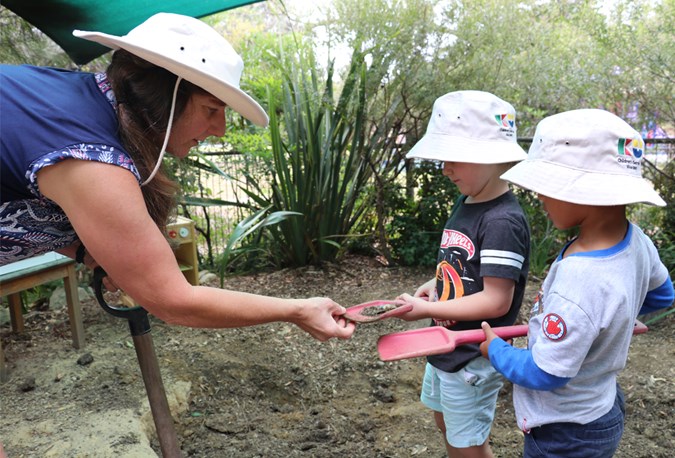
KU Childcare Berowra
Want more information?
KU Children’s Services is the recognised leader in early childhood education, providing high quality, play-based learning experiences based on approved learning frameworks. KU offer a full range of service types including preschool, long day care, occasional care, outside school hours care, work based child care, early intervention services and family programs. KU meets the early childhood needs of more than 13,000 children and their families each year and manage around 140 children’s services and programs across NSW, VIC, QLD and the ACT.
Visit www.ku.com.au to find your nearest service and experience the KU difference for yourself.
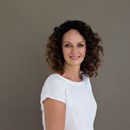
Franki Hobson is a women’s lifestyle journalist and editor with more than twenty years’ experience. Her areas of expertise include parenting and health and well-being. Franki has two gorgeous boys, Maxwell, 10, and Louis, 1 ½.
Brought to you by
